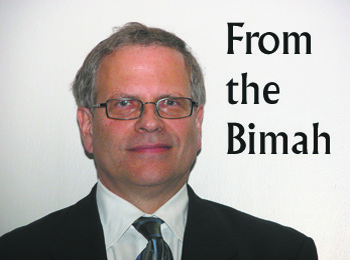The greatest change I’ve witnessed in my rabbinic career has been the role of the rabbi at funerals. In the earlier years of my career, I would deliver the eulogy at a funeral. On very rare occasions in those years, a family member or friend would be invited to speak as well.
Anybody who attends funerals today knows that the reality now is quite different. Rare today is the funeral without family speeches, with the rabbi’s role largely confined to ritual.
In many instances, this change is welcome, because there are times when family speeches are beautifully delivered, deeply moving and articulate a vision of the departed family member that brings great honour to all involved.
Having heard at least 1,000 family speeches over the last several years, I offer some unsolicited suggestions regarding them.
First, I respectfully suggest that the number of speakers be limited. The most meaningful services I’ve attended have usually involved one or two speakers, to a maximum of three. There are alternative venues available for others to offer their memories, including the tribute pages on funeral home websites. Tech-savvy family members could set up memorial pages that would host written recollections, video and audio clips. Not everybody has to speak at the funeral in order for his or her words to contribute meaningfully to the honour bestowed upon the departed.
I would also remind mourners that they are under no obligation to speak, and should not be pressured to deliver a eulogy, especially when they’re not accustomed to public speaking. On several occasions, family members have shared their discomfort with me, feeling that by not speaking, they are disrespecting their loved one. I suggest to them that being a mourner is hard enough without adding the burden of public speaking when that is outside of one’s comfort zone.
For those outside of the immediate family who are speaking, I offer one caution. Be sure that your subject matter is the deceased. Too often, a well-intentioned speaker spends as much time on him or herself as he or she does on the departed. “He and I used to…” or “she and I often…” should be kept to a minimum, since the room will be filled with many others who’ve had similar experiences with the departed, and the speaker’s personal experiences aren’t the subject of the hour. Those preparing eulogies should avoid the word “I” as much as possible, focusing, as fully as possible, on the life being remembered.
Finally, in the absence of family speakers, one shouldn’t be wary of rabbis fulfilling their traditional role as eulogizers. Even in cases where rabbis don’t know the departed, they’re trained to ask the right questions, to listen to family members and to build an appropriate tribute based on the recollections gathered.
I know that some of my best eulogies have been for people I never met, whose family members’ accounts of their lives deeply moved me and provided me with all that I needed to deliver an appropriate eulogy.
